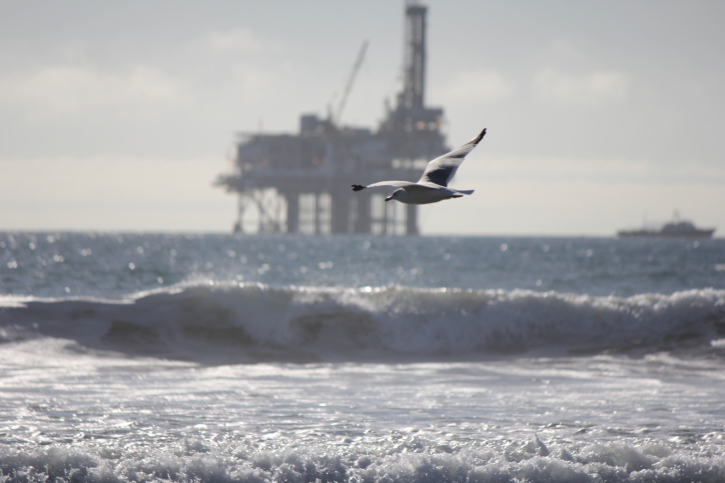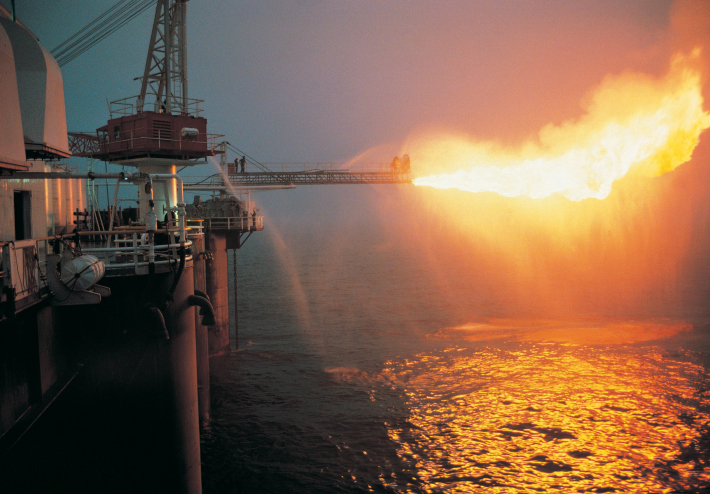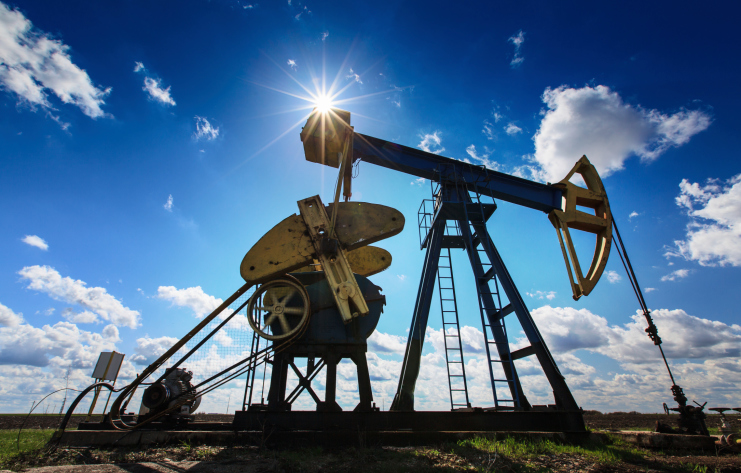10Exporters Are Experiencing Economic Chaos
Cheap gasoline is ravaging the economies of oil exporters around the world. Russia has been one of the hardest hit—it needs oil at around $100 a barrel to balance its budget and fund government services like pensions, education, and the military. The decline in oil prices has also helped fuel a currency crisis, producing inflation of over 11 percent by the end of 2014. The country’s banking system is also in crisis, while Moody’s recently cut the credit ratings of Russian government bonds and the country’s largest oil company, Gazprom, to one step above junk status. Altogether, this spells severe recession for Russia in 2015 and possibly beyond. Iran is also in trouble. With sanctions stopping it from borrowing money, the country needs oil at $136 a barrel to cover its spending. Things aren’t much better in many other OPEC member nations. In order to balance their budgets, Libya needs oil at $184 per barrel, Algeria at $131, Nigeria at $123, and Iraq at $101. In Venezuela, the economy is ready to collapse. But it’s been mismanaged for so many years that falling oil prices are just the icing on the cake. However, not all OPEC countries are about to crumble economically. For example, Saudi Arabia is capable of weathering a long period of low prices because it saved some of its windfall profits when oil was over $100 a barrel.
9Iran And Venezuela Unite To Neutralize The Threat
Meeting in Tehran in early 2015, the presidents of Iran and Venezuela stood side by side, vowing to “neutralize” the threat of plunging oil prices. The statement was a thinly veiled swipe at fellow OPEC member Saudi Arabia, which hasn’t supported coordinated production cuts to drive up the price of crude oil. Shortly after the meeting with Iran, Venezuela claimed it had reached an agreement with Saudi Arabia to “recover the market and oil prices.” But there was no matching announcement from the Saudis, and, lacking details, the Venezuelan statement doesn’t really make sense. Saudi Arabia has repeatedly said it won’t cut production because it doesn’t want to lose market share and even King Abdullah’s recent death seems unlikely to change that policy. One conspiracy theory claims that Saudi Arabia is keeping production high to sabotage Russia and Iran for supporting Syria, although the Saudis have dismissed the accusation as ridiculous. In a recent interview, Saudi billionaire Prince Alwaleed bin Talal expressed the belief that oil prices will never see $100 a barrel again: “If supply stays where it is, and demand remains weak, you better believe it is gonna go down more. But if some supply is taken off the market, and there’s some growth in demand, prices may go up. But I’m sure we’re never going to see $100 anymore. I said a year ago, the price of oil above $100 is artificial. It’s not correct.” Even Venezuelan President Nicolas Maduro appears to have finally given up. In his 2015 State of the Nation address, his response to the problem of low oil prices was simply: “God will provide.”
8The Gulf States vs. The Frackers
Desperate to regain control of the oil market, Saudi Arabia, Kuwait, and the United Arab Emirates are deliberately engaging in a price war to eliminate their new US hydraulic fracturing (“fracking”) competitors. The Gulf States blame the frackers for the sharp drop in oil prices that has caused them so much economic distress. Frackers are wildcatters who have used new technologies to extract oil and natural gas from shale formations in the United States and Canada. The OPEC members can’t nationalize these operations as they once did with American oil companies in the Middle East. OPEC doesn’t have a way to purchase the frackers either. So that leaves the strongest members of OPEC with only one strategy: a price war. The Gulf States are deliberately keeping their production high in the hope that a sustained period of low prices will be enough to bankrupt the frackers. Even if they can’t drive the frackers completely out of business, they may be able to force them to reduce production as many operations become unprofitable. Once these OPEC members clear the field, they believe they’ll be free to increase prices again with a coordinated cut in production.
7The Oil Giants May Swoop In Like Vultures
One group of American companies may actually be rooting for OPEC to win the price war with the fracking industry. In 2014, small fracking companies dominated the most productive shale oil regions, leaving the traditional energy giants in their wake. As Rice University’s Kenneth Medlock put it: “The independents jumped all over this right from the get-go; they got better acreage.” When the major oil companies turned toward heavy oil, deep water, and Arctic drilling, they lost their ability to expand quickly into shale oil. Instead, they were left to play catch-up with the small operators. So if OPEC members like Saudi Arabia drive the wildcatters out of business, the oil majors might get the chance to swoop in and buy shale assets at fire sale prices. But the wild card in OPEC’s price war strategy is to what degree the wildcatters have used the equivalent of financial insurance policies—through options, futures, and swaps—to hedge oil prices and thus protect themselves against a price decline. According to Citigroup’s Ed Morse: “OPEC should not expect to see any impact on US shale growth in the first half of the year and the impact in the second half is being [reduced] significantly by producer hedging.”
6Some Countries Benefit From Low Prices
In any economic battle, there are winners and losers—and an oil price war is no different. As the cost of crude plummets, countries that depend on agriculture are the clear winners. For every dollar of output, agriculture uses four or five times more energy than manufacturing, making cheap oil a godsend for many rural areas. Perhaps the biggest winner of all will be the Philippines—if oil prices drop below $40 a barrel, their growth is expected to average 7.6 percent for the next two years. India would also benefit greatly, with cheaper imported products reducing inflation and decreased fuel subsidies easing the strain on the national budget. Among the advanced economies, Hong Kong stands to gain the most—the city imports almost 100 percent of its energy. In other countries, the advantages are less straightforward. For example, Japanese businesses and consumers will enjoy short-term benefits from cheaper oil imports. But the inflation caused by high oil prices was a key part of the government’s strategy to combat Japan’s long-term deflationary spiral. China, the US, and the European Union are also facing mixed outlooks.
5The US May Lift Its Ban On Oil Exports
Due to the Arab oil embargo, the United States banned crude oil exports in 1975. The ban is still in effect today, with a few exceptions for exports to Canada and re-exports of foreign oil. The ban also doesn’t apply to refined oil. But in 2014, the Wall Street Journal reported that the US government had used private letter rulings to allow Enterprise Products Partners and Pioneer Natural Resources to export condensate—ultralight oil that can be transformed into diesel, jet fuel, or gasoline. Private letter rulings don’t change the law, just interpret how it can be applied in certain situations. But the ultimate effect is a legal way to get around the ban. It raises the thorny question of just how much processing is needed to differentiate between crude and refined products under the law. With US oil production surging and America’s crude oil inventories at an 80-year high for this time of year, Congress is now discussing whether to lift the ban. In a price war between the US and OPEC, some people argue that allowing crude oil exports would give American shale oil producers a greater chance of survival. Republican Congressman Joe Barton introduced legislation to lift the ban in December 2014, while his fellow Texan Ted Cruz has said that he wants an amendment ending the ban attached to the Keystone XL pipeline legislation. Meanwhile, Pemex, Mexico’s state oil company, recently made a proposal to swap crude oil with the US.
4The Green Movement Is Not Happy
Attempts to make cars and trucks more fuel-efficient are being undermined by the effects of cheap gasoline on consumer buying habits. As the sales of trucks, SUVs, and other gas-guzzlers increase, it’s getting harder for the US to meet fuel economy standards. Environmentalists worry that we’re destroying our environment by burning all this fuel. As Rhea Suh of the Natural Resources Defense Council puts it: “Oil is not cheap, at any price. With every gallon we produce, ship, and burn, we incur costs that are piling up—for ourselves and our children. The greatest burden we’re imposing on the next generation comes from the environmental damage we’re doing by consuming this fuel.” Al Gore was even more blunt: “Companies are insisting on their right to use our atmosphere as an open sewer.” At one time, we were concerned that we’d run out of fossil fuels. But now, some environmentalists are worried that we might have too much. To reduce the effects of climate change, they argue that 33 percent of global oil reserves, 50 percent of gas reserves, and more than 80 percent of coal reserves should stay in the ground.
3Speculators Are Making Crazy Trades
Oil traders, sometimes called speculators, make money betting on crude oil futures. Essentially, an oil trader buys or sells a contract for a certain quantity of oil to be delivered in the future, at a price that’s agreed upon in the present. So, for example, if you believe oil prices are going to go down, then you would sell a futures contract, meaning you agree to sell oil at a certain time in the future at a price agreed on today. If the price of oil falls, then you can buy back the contract you sold at the lower price. Your profit is the difference between the higher price at which you originally sold the contract and the lower price at which you bought it back. If you think prices will rise in the future, you would simply do the opposite. Most traders just trade the contracts and rarely take delivery of the physical oil. For one thing, they usually don’t have anywhere to store it. But in an attempt to duplicate a 2009 trading strategy that reaped huge profits the last time oil prices crashed, some traders are scrambling to lease supertankers. That way, they can take delivery of the physical oil and store it at sea for up to a year while they wait for a rally in prices. It seems like a crazy gamble, but it can make big money. With the cost of leasing some supertankers at $40,000 a day, the strategy can only be used by large, well-financed traders like Vitol (the largest independent oil trader in the world). Depending on the trade, it can be a risky bet, with profits by no means assured.
2Low Oil Prices May Rewrite Diplomatic Policy
The 1970s redefined international politics, as crude oil became the weapon of choice for OPEC to bring the United States and its import-dependent allies to their knees. It started with the 1973 Arab oil embargo, when the Arab states temporarily stopped exporting oil to the US and certain Western European countries because they’d supported Israel during the Yom Kippur War. Not only did the embargo produce short-term gas shortages, it was also the catalyst for long-term price increases that spurred conservation efforts and the desire for energy independence in the US. Petro-politics has reigned supreme ever since. To keep the oil flowing, oil importers often ignored human rights violations in OPEC nations. But the boom in shale oil production is changing global politics once again. As the world’s new leading oil producer, the United States is shifting the balance of power away from OPEC. As we’ve already talked about, some OPEC members are engaging in a fierce price war with US frackers to try and regain control of the global oil market. For now, though, some people believe that low-priced oil may be an even more effective political weapon than an embargo. Whether intentionally used by the West or not, sharply declining oil revenues weaken the current regimes of countries like Iran even more effectively than sanctions. As non-OPEC nations become more energy-independent, OPEC will continue to lose its political power.
1Backlash Over Low Prices And Fracking Comes Home
America’s new position as the world’s leading oil producer has also created controversy at home. Fracking, the very technology that helped to free the US from the whims of OPEC, has been blamed for some serious problems—earthquakes in Arkansas, Kansas, Ohio, Oklahoma, and Texas have been attributed to fracking. In Youngstown, Ohio, fracking was found to have built up pressure underground that eventually resulted in repeated slippage in an existing fault. In Oklahoma, quakes have become more numerous and more powerful as fracking activity has increased. Wastewater injection wells, which are used to get rid of fracking fluid by injecting it deep within the ground, are often the culprit. But homeowners with damaged properties have found that lawsuits against the frackers are hard to win. Fracking has also been implicated in water and air pollution. From an economic standpoint, low oil prices have begun to affect the budgets of Alaska, Louisiana, North Dakota, Oklahoma, Texas, and Wyoming. Many drillers are planning to reduce production because the market is glutted with oil. In the fracking industry, job losses come before a drop in production. There’s even a debate about whether it makes sense to build the Keystone XL oil pipeline now.
























